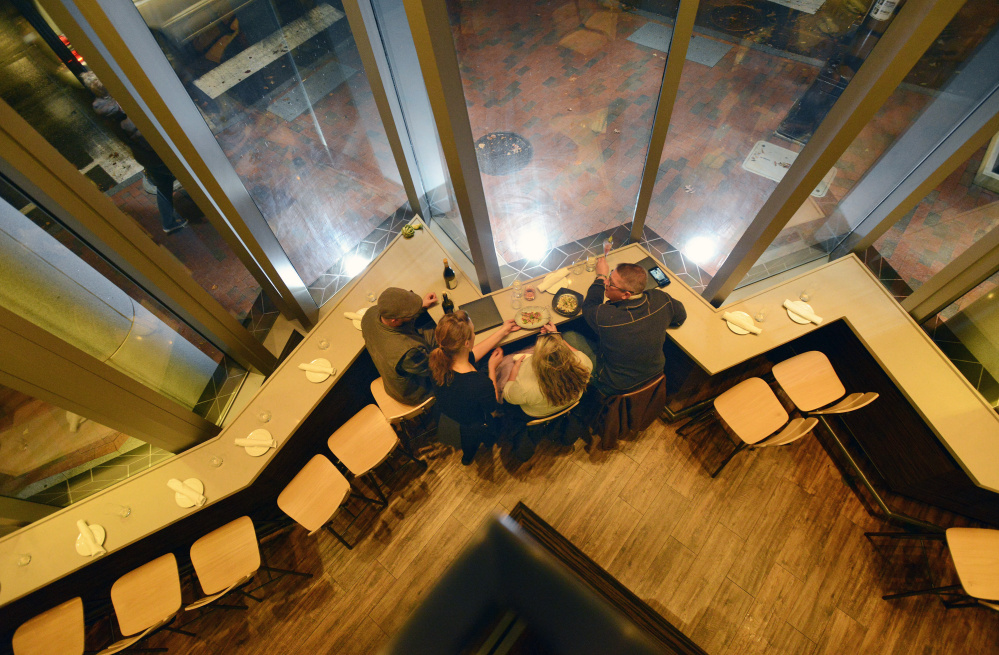Turns out good things really do come in small packages.
Evo, a tiny jewel box of a restaurant tucked into one corner of the Hyatt hotel on Fore Street, serves mezze – the diminutive, starter-sized dishes popular from the Middle East to the Balkans.
Executive chef Matt Ginn prepares them using local ingredients that he accents with a host of eastern Mediterranean flavors – and, oh, those flavors! The lemony tang of sumac … the fiery punch of chili harissa … the creamy richness of tahini … the sweetness of aleppo pepper.
The flavors are warm and bold and potent, and composed so skillfully that you’re constantly surprised but never overwhelmed. (You’ll see no customers desperately signaling for a glass of water.)
The individual servings look modest at first, but you quickly discover that they’re filling, and every single dish – including dessert – delivers enormous flavor and satisfaction.
“We’re all about reinterpreting flavors and elevating them,” Ginn says. “Customers initially think that our name stands for Extra-Virgin Olive Oil, but Evo actually stands for the evolution of eastern Mediterranean food … rustic mezze reinvented.”
With apologies to Darwin, evolution hasn’t seemed this exciting in eons.
The restaurant fills a soaring, contemporary space (designed by Canal 5 Studio in Portland) that is divided into two distinct areas: There’s seating for 28 customers at the bar and counters located at street level, and room for about 20 more at the tables filling the mezzanine above. Walk inside and you’ll see couples leaning over the bar, enthusing over steaming rounds of fluffy pita bread, or watching the controlled chaos in the modest kitchen. (“We work with one oven that has four burners,” Ginn says. “I have more fire power at home … but a small space forces you to be organized.”) Whether it’s the elegant interior, or the elegant wait staff (“Did you notice that they’re all beautiful?” a friend asked), it’s like entering a glittering urban loft where you know you’ll find something unexpected – and immediately feel part of the cool crowd.
The sense of drama builds as the first plates ascend from the kitchen. “Is this the baba gannouj?” we ask, when the waitress sets down a little saucer filled with a pale spread ($8) and topped with what look like bite-sized red flower blossoms. “It is,” she says, “roasted eggplant and garlic and lemon, and those are oven-dried tomatoes on top.” The baba is silky and smooth, mildly spiced with hints of pepper and fresh mint, and served with three rounds of the steamed pita we saw earlier. The eggplant tastes luxurious on its own, but it’s exquisite when used to fill the tender bread – especially with a sugary tomato folded in for good measure. Any fears of heading home hungry disappear quickly with that first, satisfying dish.
Roasted cauliflower ($8) is a lacy revelation. (Unlikely, yes, but you’ll just have to believe me.) The tiny florets are delicate and moist, with caramelized brown edges and the merest hint of salt. That deep, sesame flavor you taste with each forkful comes from a few drops of tahini sauce drizzled over the plate, and there’s an intense sweetness from a dab of what turns out to be pureed raisins that Ginn uses to balance the dish. We’re bowled over.
Presentation matters here, and lamb shawarma ($10) looks like a designer’s tribute to all things white. The lamb is swaddled in a pale, almost translucent round of Marook Mountain bread, served on a plain white plate, with half of a pickled white turnip on the side. (“Because of the way it’s wrapped, we call this our Lebanese burrito,” Ginn says.) The petite portion of hakurei turnip is crunchy, sour and sugary at the same time. The paper-thin slices of shaved lamb are marvelously mild. They dissolve so quickly on the tongue you’re left with only memories and regret.
Perhaps unsurprisingly, chicken ($10) served on skewers – the most predictable item on the menu – was the least interesting. The bed of barley was tasty (the pearls are cooked in chicken stock and taste soft and comforting), but the thin pieces of breast meat were dry.
Evo’s Maine lobster ($16) on the other hand, was unforgettable. Ginn was named Maine Lobster Chef of the Year last month for a version of this dish, and it’s easy to see why. First there’s the meat itself, a medium-sized claw and a single chunk of tail meat, so tender and sweet you’ll have to force yourself to share. Then there are little X’s of Turkish pasta – called manti – filled with starchy butternut squash and a few drops of tart yogurt. And, finally, there’s the broth pooling on the bottom of the free-form bowl – a pungent lobster stock so concentrated it coats the back of a spoon like a long-simmered seafood stew. Altogether, it’s opulence in a bowl.
The noise level was rising by the time we reluctantly allowed the waitress to clear our collection of small plates. But we couldn’t head home yet. We’d seen a few desserts carried to another table, and they looked too good to pass up.
The bitterness some people dislike in sesame paste appeals to me – it’s nutty and oily and distinctive. At Evo, tahini is used in a parfait ($8) topped with a shining layer of honey gelee and a sprinkling of candied pine nuts. The parfait is creamy and sweet, like gelato, but more sumptuous (if that’s possible.) A Lilliputian dollop of yogurt on top and a dribble of fruit puree cut through the sweetness and provide a delicious contrast. Who’d have thought that sweetened sesame paste could be vibrant? This version is. So is the date cake ($11), a dark, moist sliver served on top of a pudding made with yogurt and finished with segments of fresh citrus.
Evo may be a compact little restaurant, but flavors this big are no small matter. This is a restaurant with huge ambitions and a very bright future.
Send questions/comments to the editors.



